Ancestral spirits, or anito, are central to Filipino culture, guiding daily life and family connections. They influence moral behavior and promote communal harmony through rituals and offerings. For instance, families gather for pag-anito rituals to honor their ancestors, fostering a sense of community and respect for tradition.
In times of distress, people turn to ancestral spirits for protection and guidance. This reliance on ancestral spirits reinforces emotional resilience within communities. For example, during natural disasters or personal crises, Filipinos may offer prayers and sacrifices to their ancestors, seeking comfort and strength.
The relationship between ancestral spirits and the natural world is deeply intertwined. Ancestral spirits are believed to be connected to the land, forests, and natural elements, emphasizing the importance of cultural heritage and environmental stewardship.
Understanding the nuances of ancestral spirits across different ethnic groups can deepen one's appreciation for their significance. Each ethnic group has its unique perspective on ancestral spirits, reflecting their distinct history, customs, and traditions.
Ancestral Spirits Defined
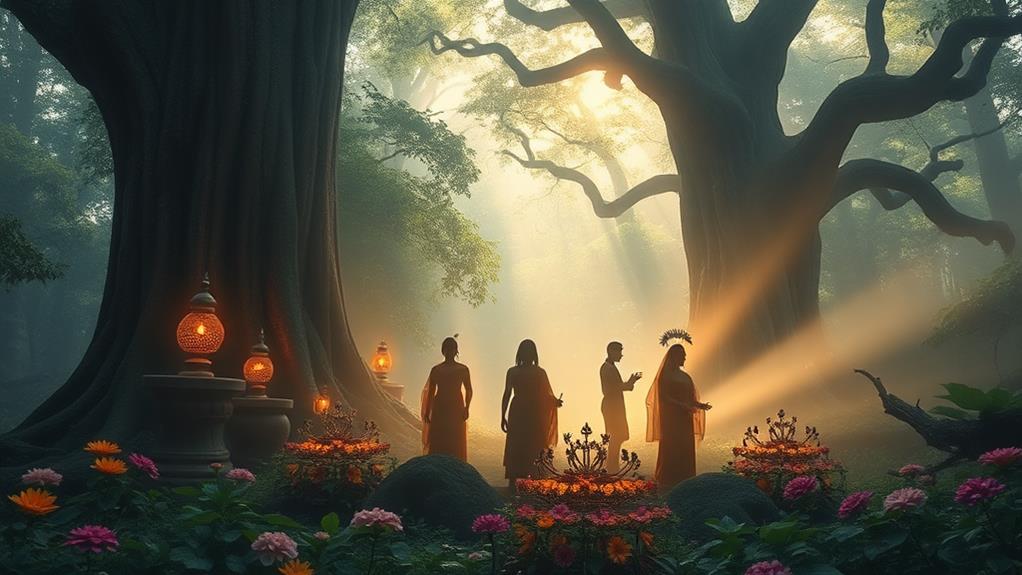
Ancestral spirits, or anito, are a vital part of Filipino culture, believing that the deceased continue to influence the living. In indigenous Philippine folk religions, these spirits are revered as essential forces guiding and protecting families and communities.
Ancestral spirits are rooted in animistic beliefs, where every element of nature is thought to possess a spirit. This highlights the interconnectedness of the spirit world and the material realm.
Ancestors are believed to directly impact the well-being of the living. Rituals, often conducted during times of illness or distress, provide a means to honor these spirits and seek their guidance.
For example, offerings of food and communal feasts not only strengthen community bonds but also maintain connections with the spiritual realm.
Ancestral spirits serve as guardians upholding cultural values and fostering communal harmony. They play a significant role in shaping interpersonal relationships and practices of forgiveness, illustrating their enduring influence in contemporary Filipino society.
Cultural Significance of Ancestral Spirits
Ancestral Spirits in Filipino Culture
In Filipino culture, ancestral spirits, known as anito, play a vital role in shaping daily life and social dynamics. These spirits act as guardians of families and communities, fostering a shared identity among the living. They influence behaviors such as forgiveness and communal healing through rituals and practices that reflect respect and a desire for guidance.
The Presence of Ancestral Wisdom Shapes Moral Conduct
The presence of ancestral wisdom shapes moral conduct and interpersonal relationships. Elders frequently mediate forgiveness rituals, reinforcing familial bonds and promoting harmony. This veneration not only upholds family honor but also links past generations to present practices, creating a strong sense of cultural identity.
Cultivating Emotional Resilience
As individuals participate in these traditions, they cultivate emotional resilience within their community, allowing for collective growth and understanding. This veneration serves as a reminder of the interconnectedness between the living and the departed, enriching everyday experiences and reinforcing the values that bind individuals to their heritage.
Rituals and Offerings to Ancestors
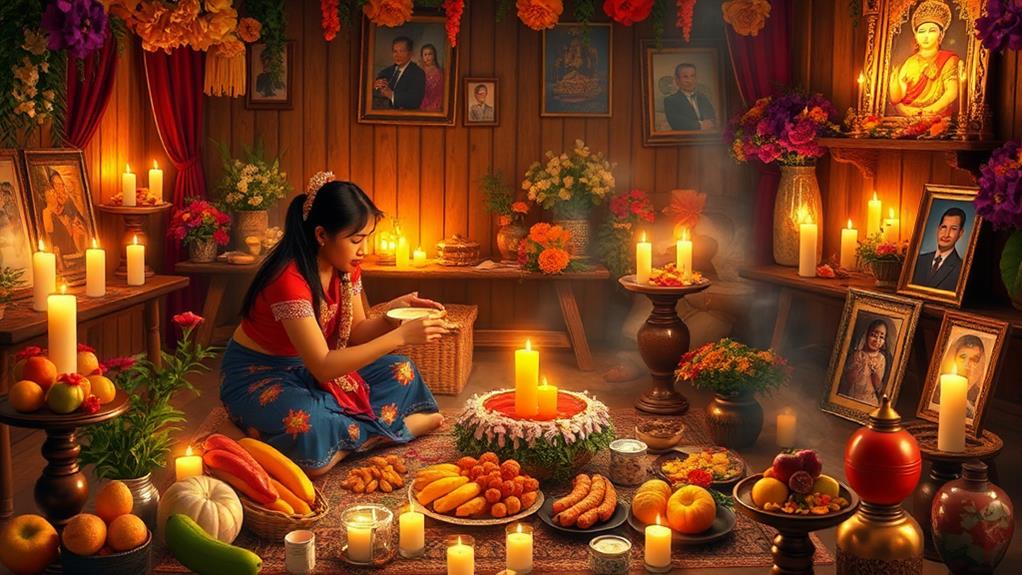
Rituals and Offerings to Ancestors
In Filipino culture, rituals and offerings to ancestors create a profound connection between the living and the spirit world. These practices, known as pag-anito, invoke ancestral spirits for guidance and protection.
Offerings Symbolize Respect and Sustenance
Offerings typically include rice, meat, and fish, symbolizing sustenance and respect for the spirits. These offerings are a way to show appreciation and gratitude to the ancestors.
Golden Ornaments as Ransoms
During illness, golden ornaments often act as ransoms, showcasing the belief in appeasing ancestor spirits. This practice highlights the significance of seeking ancestral protection and healing.
Shamans Facilitate Communication
Shamans, predominantly women, serve as vital mediums, facilitating communication by allowing spirits to possess their bodies. This enables the living to receive guidance and wisdom from their ancestors.
Spirit Boats Reinforce Connection
Spirit boats (taltalabong) take offerings adrift, reinforcing the connection between physical and spiritual realms. This ritual emphasizes the bond between the living and the ancestors, transcending the physical world.
Veneration of Natural Elements
The veneration of natural elements, such as trees and rocks, illustrates deep ties to ancestry and the belief that nature is alive with spirits. This practice acknowledges the interconnectedness of all living things.
Honoring Ancestors
Through these rituals and offerings, you actively participate in a continuous dialogue with your ancestors, reinforcing cultural identity and community cohesion while honoring the guiding spirits that shape your life.
Ancestral Spirits in Filipino Mythology
Ancestral Spirits in Filipino Mythology
The Significance of Anito
In Filipino mythology, ancestral spirits, known as "anito," hold a significant place.
These spirits embody the essence of deceased ancestors, acting as guardians over family and community. They influence daily life and moral conduct, guiding decisions and interactions with others.
Rituals and Offerings
Rituals honoring these ancestral spirits, such as "pag-anito," involve offerings and communal feasts aimed at seeking protection and blessings from the spirit world. This practice emphasizes the belief that the anito aren't just relics of the past; they actively participate in the lives of the living.
Reincarnation and Symbolism
The concept of reincarnation in Filipino mythology suggests that the souls of ancestors might return to inhabit new lives, reflecting their conduct in the spirit realm.
Symbolically, ancestral spirits are represented through taotao figures, which serve as poignant reminders of the enduring connection between the living and the spirit world.
Embracing a Holistic Understanding
By recognizing the role of anito, you embrace a holistic understanding of life that intertwines the past, present, and future within Filipino culture.
This understanding highlights the importance of honoring and respecting one's ancestors in daily life.
Ethnic Variations in Spirit Beliefs
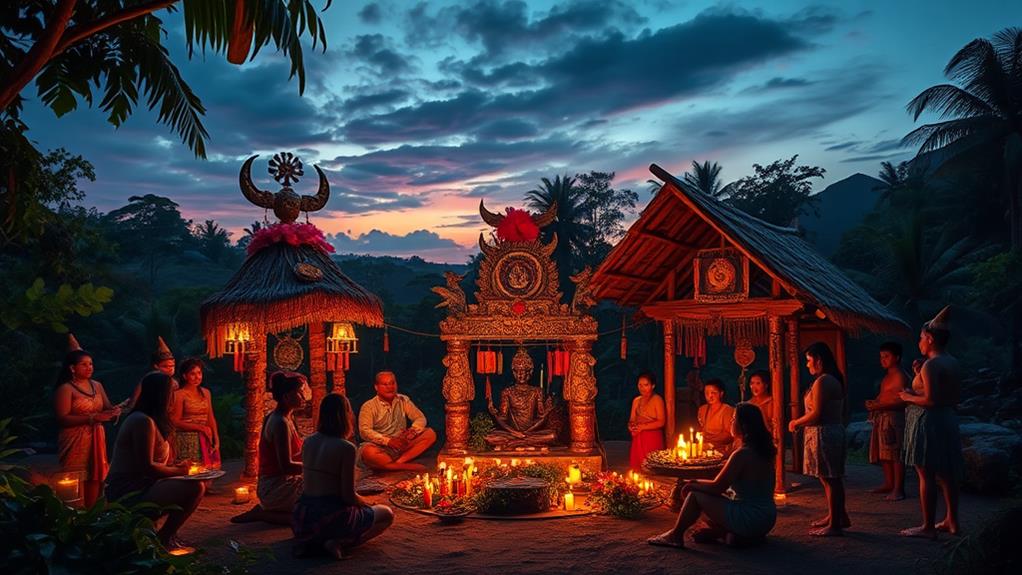
Ethnic Variations in Spirit Beliefs
Filipino ethnic groups have distinct beliefs about ancestral spirits, shaping their cultural practices and worldview.
Interpretations of Soul Existence
Each indigenous Filipino ethnic group has its unique understanding of the spirits of the dead. For example, the Ifugao believe in two souls tied to one's eyes and breath, associating illness with soul loss.
In contrast, the Ibaloi believe that their deceased ancestors' souls rest on Mount Pulag, a sacred sanctuary.
Burial and Memorial Practices
These ethnic groups also have unique burial and memorial practices. For instance, the Kalinga have specific hours when souls roam, guiding the living on when to interact with them.
Rituals for Communicating with Spirits
Filipino ethnic groups have rituals for communicating with spirits. The Tagalog believe that a soul's journey during sleep can lead to nightmares, while the kaluluwa transitions to the afterlife post-death.
The Ibanag's belief in the mekararuanan phenomenon illustrates a fascinating body-soul dynamic, where survival is possible despite soul loss.
Specific Times for Spirit Interaction
Additionally, these ethnic groups have specific times designated for spirit interaction. The Kalinga, for example, have designated hours when souls roam, guiding the living on when to interact with them.
Understandings of Dreams and Nightmares
Filipino ethnic groups also have varied understandings of dreams and nightmares. The Tagalog believe that a soul's journey during sleep can lead to nightmares.
These ethnic variations reflect the profound and intricate relationships Filipino ethnic groups maintain with their ancestral spirits, enriching their cultural identity.
Connection to Nature and Environment
Filipino indigenous cultures maintain a profound connection to the environment because they believe ancestral spirits animate and govern natural elements.
This connection is rooted in the veneration of nature spirits, or diwata, which are believed to inhabit specific natural features like towering mountains or serene waterfalls.
To show respect, people engage in rituals that involve placing food and symbolic items in nature, demonstrating the interconnectedness of the physical and spiritual realms.
Rituals and offerings honor ancestral spirits and reinforce environmental harmony. For example, sacred spaces like bamboo and rattan shrines serve as altars for worship, highlighting the importance of preserving the environment as a conduit for ancestral connection.
The health of one's surroundings directly impacts the well-being of ancestral spirits and the community.
By engaging in these practices, people acknowledge the significance of maintaining a sustainable relationship with the environment.
Every tree, river, and breeze plays a role in the delicate balance of life, and this understanding fosters a deep respect for nature.
Challenges to Ancestral Wisdom
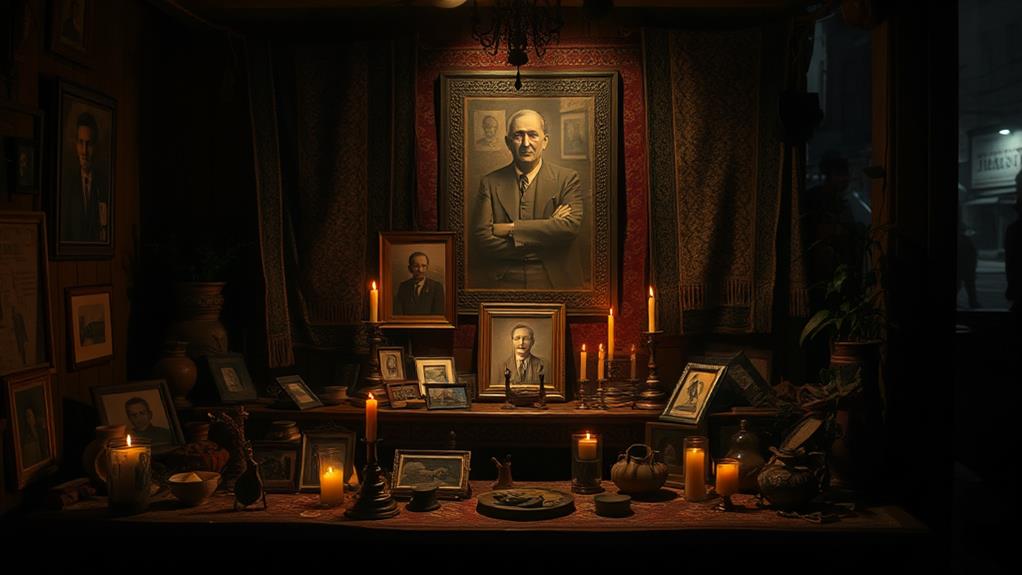
Challenges to Ancestral Wisdom
As modern influences spread through Filipino society, ancestral wisdom faces challenges in holding its ground against globalization and urbanization.
Many younger Filipinos prioritize contemporary values, causing a disconnect from cultural heritage and traditional rituals.
One significant challenge is the marginalization of indigenous beliefs by Western ideologies, which erodes the practice of honoring ancestral spirits.
Technology and social media introduce new forms of expression that can dilute or misrepresent traditional practices.
Several factors contribute to the erosion of ancestral wisdom:
Prioritizing modern lifestyles over traditional teachings leads to a decline in the transmission of ancestral knowledge.
The erosion of rituals that connect individuals to their ancestors further weakens cultural ties.
Misrepresentation of indigenous beliefs through popular culture distorts the true essence of ancestral wisdom.
Limited accessibility of resources for learning about ancestral wisdom hinders efforts to preserve cultural heritage.
Urban migration also impacts community ties and cultural continuity, leading to a loss of ancestral wisdom.
Recognizing these challenges is crucial for fostering a renewed appreciation for the invaluable teachings of the past.
How do Ancestral Spirits Influence the Practices of Traditional Filipino Healers and Spiritual Guides?
Ancestral spirits play a significant role in shaping the practices of traditional filipino healers and spiritual guides. These healers believe that their abilities are passed down from their ancestors, and they rely on the guidance and wisdom of these ancestral spirits to carry out their healing rituals and ceremonies. The strong connection to their ancestors is at the core of traditional Filipino healers’ practices.
Contemporary Expressions of Ancestral Heritage
Filipinos deeply respect their cultural roots, incorporating ancestral heritage into daily life. Many Filipinos perform rituals and make offerings to honor their ancestors, demonstrating a strong commitment to maintaining these traditions.
Social media platforms have become modern avenues for sharing ancestral stories and narratives, allowing younger generations to connect with their cultural heritage.
Traditional healing practices remain prevalent, where ancestral spirits are invoked to address personal and communal challenges. For example, the concept of "Bayanihan" emphasizes communal support and collective responsibility, drawing heavily from ancestral guidance.
This concept continues to shape modern social interactions and community engagement, demonstrating the enduring relevance of ancestral wisdom.
Cultural representations in film and literature explore themes of ancestral spirits, illustrating their significance in contemporary narratives. For instance, stories often feature ancestors guiding characters or influencing their decisions, highlighting the importance of cultural heritage in understanding one's identity.
The Role of Ancestral Spirits Today
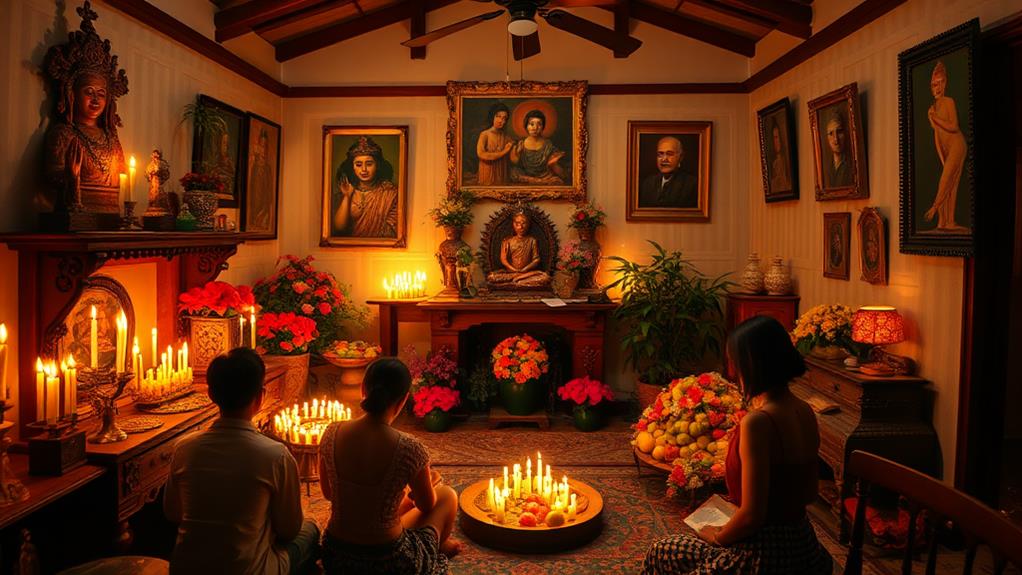
Ancestral spirits play a vital role in modern Filipino culture, influencing how families connect with each other and honor their heritage through various rituals.
Communal rituals promote social cohesion and collective healing. For instance, these rituals bring families and communities together, fostering a sense of unity and collective well-being.
Ancestral spirits are invoked during significant life events. In Filipino culture, ancestors are often honored during weddings, funerals, and other important life milestones.
Engaging with ancestral traditions can enhance emotional resilience and reduce anxiety. By connecting with their heritage, individuals can develop a stronger sense of identity and emotional stability.
Social media helps share ancestral stories and practices, fostering a sense of community. Online platforms provide a space for people to share their ancestral traditions, promoting a greater understanding and appreciation of Filipino culture.
Forgiveness and harmony are emphasized, strengthening family bonds. Ancestral spirits are often associated with promoting forgiveness, understanding, and harmony within families, leading to stronger, more resilient relationships.
Ancestral spirits serve as a source of strength and continuity. By honoring their ancestors, individuals can tap into a sense of wisdom, comfort, and guidance, helping them navigate life's challenges.
Questions and Answers
What Are the Ancestral Spirits of the Philippines?
Ancestral spirits in Filipino mythology are believed to embody the souls of deceased ancestors, guiding the living. These spirits, known as "anito," are revered and communicated with through spirit mediums, who facilitate connection and offer guidance during cultural rituals.
In these rituals, food offerings and communal gatherings are common practices, demonstrating respect and a desire for connection. By honoring these ancestral spirits, Filipinos preserve cultural identity and strengthen community bonds, fostering a sense of shared responsibility.
What Is the Role of the Ancestral Spirits?
Ancestral spirits provide guidance and protection in daily life. They connect individuals to their cultural heritage, fostering a sense of identity and community. For example, in many African cultures, ancestral spirits are believed to offer wisdom and protection to their descendants.
Honoring ancestral spirits reinforces family ties and communal harmony. When individuals honor their ancestors, they ensure that values are passed down through generations. This is evident in many Asian cultures, where ancestors are revered through rituals and offerings to maintain family unity and respect.
Ancestral spirits influence moral conduct and offer emotional support. Their presence guides individuals to make morally upright decisions and provides comfort in times of need.
In many Indigenous cultures, ancestral spirits are believed to offer guidance and protection, helping individuals cope with challenges and develop resilience within their communities.
What Do Filipinos Believe About the Spirits?
Filipinos hold a deep spiritual connection with ancestral spirits, believing they're protectors and guides. This belief is rooted in their cultural significance, emphasizing respect and remembrance.
For instance, Filipinos acknowledge that ancestral spirits influence daily life, offering comfort during hardships and fostering communal ties.
To nurture a sense of belonging, they perform rituals and make offerings, such as food and drink, to honor their ancestors.
These traditions celebrate their heritage and shared identity, reinforcing their cultural practices.
What Is Ancestor Worship in the Philippines?
Ancestor worship in the Philippines is a ritual practice that honors and invokes the spirits of one's forebears.
This practice involves participating in communal ceremonies where food and symbolic items representing life cycles are offered to strengthen family connections and cultural heritage.
These ceremonies reflect a deep respect for generational wisdom, as individuals seek guidance and blessings for both the living and the deceased.